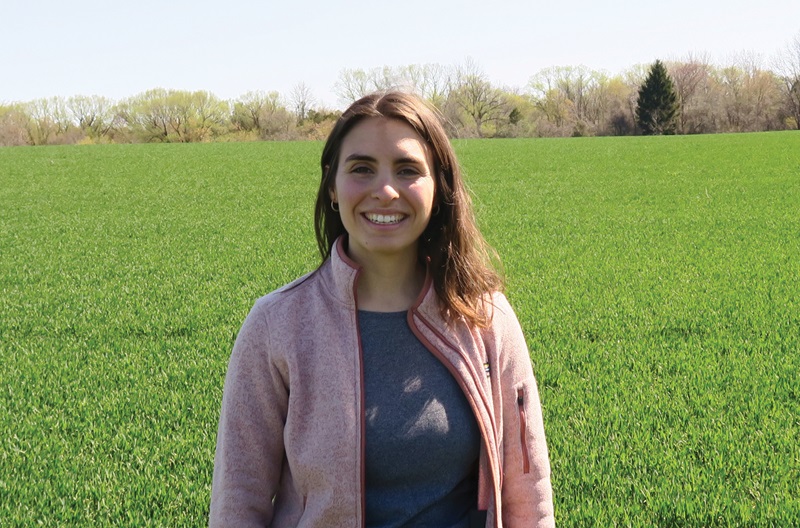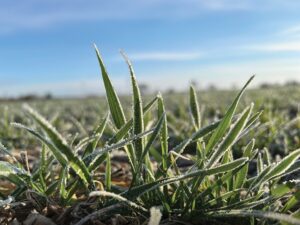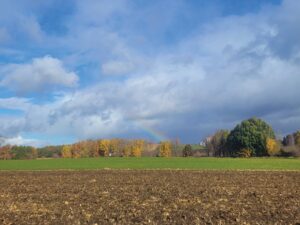Critical weed management research continues
New University of Guelph professor Isabelle Aicklen

It was made official in late March. Dr. Isabelle Aicklen became the ‘Ontario Bean Growers Assistant Professor in Weed Management’ at the University of Guelph, Ridgetown Campus, as part of the Ontario Agricultural College (OAC).
Aicklen has accepted the torch passed to her from the recently retired Dr. Peter Sikkema, who led weed research in edible beans at University of Guelph for many years and was inducted into the Ontario Agricultural Hall of Fame in 2021.
“We’re excited to have Dr. Aicklen as the new weed scientist in Ridgetown and look forward to working with her to expand innovative and practical research for Ontario farmers,” says Josh Cowan, director of research and innovation at Grain Farmers of Ontario. “Her broad foundation in weed science and her collaborative, farmer- focused research vision will help Ontario farmers tackle the weed management challenges of today and the future.”
Mike Cowbrough, Ontario Ministry of Agriculture, Food and Agribusiness field crops weed management specialist, also wholeheartedly welcomes Aicklen. He explains that he first had the privilege of interacting with her when she was an undergraduate student competing for the OAC ‘Weeds Team’ and then as a graduate student. “Dr. Aicklen has consistently demonstrated a thorough and strong work ethic, with a mindset towards service and improvement,” Cowbrough says. “I’ve been impressed with how she approaches her own research projects, where she continually seeks input from various stakeholders so that she has a thorough understanding of the issue and how best to tackle it. I look forward to supporting her and her research program in any way that is helpful to her and the people she serves.”
Ontario Bean Growers (OBG) and an anonymous donor are supporting Aicklen’s work to advance weed management research. OBG is contributing $660,000 of a greater industry investment of $2 million in this professorship position over the next ten years. The funding will also support OAC’s Huron Research Station.
GROWING AN INTEREST
The idea to study crops germinated early in Aicklen’s life, as she was exposed to farming through her grandfather, who grew up on a farm in Saskatchewan. “I learned about it from him, and that got me interested in agriculture as a career,” she says. “There seemed to be a lot of potential. I chose to do an undergrad at the University of Guelph and got into crop and weed science through various courses, along with summer job positions at Cargill and Syngenta Canada. I did an undergrad project on weed science and then continued study in that area in graduate school, starting a master’s degree and then transitioning into a PhD.”
Aicklen’s research has the overall objective of advancing weed management practices in Ontario, with a focus on the management of herbicide-resistant weeds such as pigweed species, Canada fleabane, waterhemp, and common ragweed in dry beans, corn, soybeans, and cereals. “There aren’t as many active ingredients registered for use in dry beans, especially with limitations due to increasing cases of herbicide resistance. I will be investigating new potential active ingredients, as well as desiccation tactics and crop tolerance,” Aicklen explains. “Weed control in dry beans is particularly challenging because there aren’t as many options compared to corn and soybeans.”
Aicklen will also look at the control of volunteer Enlist corn in E3 soybean, which is resistant to 2,4-D, glyphosate, glufosinate, and some aryloxyphenoxypropionate herbicides (FOPs). Control of Palmer amaranth is another focus.
“It’s still low density in Ontario but it’s prevalent in the U.S. and a very competitive weed with many crops,” Aicklen says. “But while resistance is a big concern, I am excited about how herbicides can be combined with new weed control techniques such as electrical and laser weeders, for example.
We need to continue using integrated weed management approaches that include both chemical and non-chemical strategies. We also need to work closely with colleagues in the U.S. as they have dealt with increasing cases of herbicide resistance, and they are, therefore, a valuable resource in evaluating various strategies.”
MOLECULAR ASPECTS
Over the long term, Aicklen remains interested in understanding the molecular mechanisms underpinning herbicide resistance. Several years ago, green pigweed resistant to some Group 4 herbicides was found in a field of processing peas in southwestern Ontario— the first case of Group 4 herbicide resistance in Ontario—and Aicklen made this the focus of her doctorate. Group 4 chemistry was introduced many decades ago, during World War 2, and weeds have been slow to develop resistance to it compared to Groups 2 and 5 chemistries, for example.
Aicklen did greenhouse tests to confirm resistance in the discovered green pigweed population. She then completed the first comprehensive review of pre- and post- herbicide options for controlling resistant green pigweed in soybeans and corn. She also investigated the molecular mechanisms of Group 4 chemistry resistance (synthetic auxin herbicide resistance) in this population. Aicklen ruled out several possible mechanisms, which substantially advanced the progress towards unravelling the resistance puzzle of group 4 herbicides.
Looking ahead, Aicklen sees molecular research becoming increasingly important in controlling resistant weeds. “I would be interested to help develop a rapid test for farmers to quickly determine what resistance is present in their field,” she says. “Currently, farmers can send tissue samples to confirm resistance to some herbicides, but this is limited to certain modes of action.”
In the meantime, Aicklen is focused on producing results that form solid programs of recommended practices for Ontario crop growers to better manage weeds. “I want to help farmers continue to be productive, profitable and ultimately to continue to increase crop yields,” she says. “That’s the main goal for me.”
Aicklen is also enjoying Ridgetown. “It’s a smaller campus, which makes it easier to get to know people at the same time I’m getting to know the great community,” she says. “I am grateful to the OBG for supporting this position and for their interest in my work and what I can bring to this role. I am looking forward to collaborating with colleagues in helping Ontario growers continue to achieve high yields.” •




























